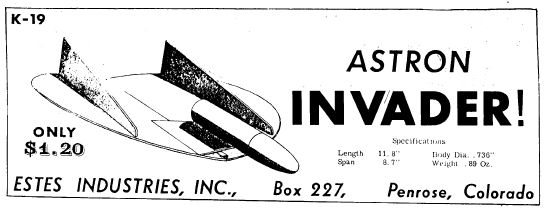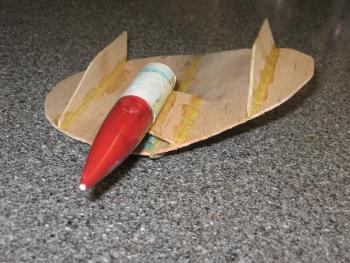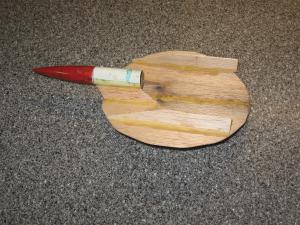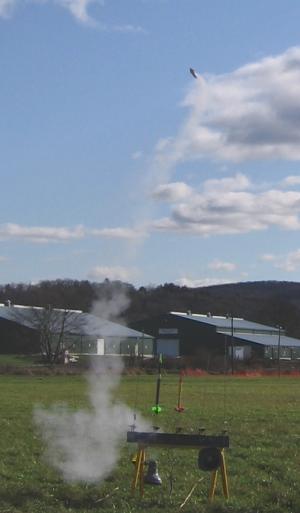Scratch Astron Invader (downscale) Original Design / Scratch Built
Scratch - Astron Invader (downscale) {Scratch}
Contributed by David Sindel
| Manufacturer: | Scratch |
Brief:
This is my semi-downscale of the old (1965-67) K-19 Astron Invader. The wings and fins are 2/3 of the original, but I
kept the 18mm motor mount. It's a very unique glider with unusual flights and a fairly easy build.

 Construction:
Construction:
I built this from scratch. I used a PNC-20 (2.85" long) and 2" of BT-20 from an Estes Viking. The wing-fins
are 2/3 scale based on the plans for JimZ's site. I used light balsa for the two vertical fins, medium for the keel,
and hard balsa for the two wing halves and two pylons. All balsa was 1/16". I put an old 1/8" launch lug on.
I followed the basic instructions from JimZ's site. With the smaller wings, 3" balsa can be used for the wings without having to butt-glue balsa sheets. Several points for construction:
- Make sure the two wings halves fit together perfectly!
- Glue the wings at a slight dihedral, then attach the fins at 90 degrees to the wings.
- Fillet all glue joints
- Make sure the pylons fit the wing exactly. This will take lots of sanding, but the pylon must be secure for safe flight.
- Attach the launch lug in the wing joint under the pod before you attach the pod.
- Use wood glue for all joints and fillet or double-fillet everything.
PROs: Only 7 parts. Inexpensive parts. No more butt-gluing!
CONs: Lots of sanding. Parts must fit perfectly. Cut your own balsa.
I would call this a Level 3 kit due to the tricky balsa joints and amount of sanding.
 Finishing:
Finishing:
The finishing I did was the preexisting red on the nose cone. I recommend not painting this rocket to save weight.
PRO: Easy finishing, just paint the NC red.
CON: Plain looks.
Flight:
Estes recommended the 1/2A8-2, A8-3, and B8-2. I'd recommend the B4-2, B6-2, and C6-3. The 1/2A6-2, A8-3, and B6-4
are okay for straight-up launches on windless days. An adapter for the 1/2A3-2T would be useful.
Be careful! The motor must eject out the back to glide. You'll need to add a streamer for it (wrap it around the motor, then insert) to satisfy the RSO and NAR flight rules.
Mine balanced perfectly without any weight. Your results may vary. I estimate a glide ratio of better than 10:1.
 The first flight was on an A8-3 in about 3 mph of wind. It launched straight up, did
a horizontal figure-8 at about 40ft, then continued vertically to 100 feet of so. The 3-second delay was too long. It
ejected at 15ft, glided a few feet, and lawn-darted with no damage. The casing landed 20 feet away.
The first flight was on an A8-3 in about 3 mph of wind. It launched straight up, did
a horizontal figure-8 at about 40ft, then continued vertically to 100 feet of so. The 3-second delay was too long. It
ejected at 15ft, glided a few feet, and lawn-darted with no damage. The casing landed 20 feet away.
The second flight was on a B6-4 in the same conditions. It did rather spectacular acrobatics at about 50 feet then again returned to normal flight to about 200 feet. Ejection was again way past at maybe 50 feet. It fell to about 15 feet then settled into a respectable 5-second fast glide. Again, no damage.
Recovery:
PROs: Spectacular acrobatics. Good glide. Easy to balance. Withstands hard landings. Needs no wadding--easy flight
prep.
CONs: acrobatics may result in DQ'd flight. Needs some altitude to begin glide. Ejects motor casing (intentionally).
Summary:
This is a great rocket to scratch build. It only takes two manufactured components, it's dirt cheap, and it glides
great.
The only improvable thing would be a streamer for the motor so it can be used in NAR competition.
PROs: Unique looks. Simple construction. Unusual acrobatics. Great glides
CONs: Motor ejection. Difficult balsa joints.
 |
 |